新课标人教版英语选择性必修一Unit1 Using Language 导学案及答案
Unit 1 Using language 人物介绍 高中英语人教版(2019)选择性必修第一册
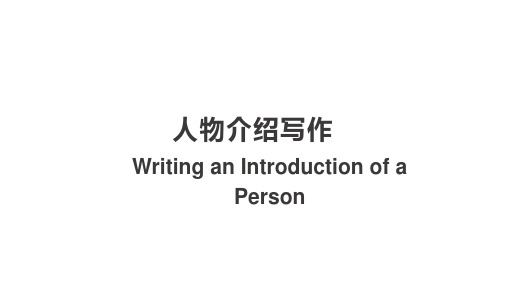
Yuan Longping’s work is so important that he helped solve the problem of food shortage
The person I admire most is Yuan Longping, a committed and patient agricultural scientist in our country. He was well-known because he devoted his entire life to improving the technology of hybrid rice
Born in +地点+时间,sb. graduated from…. Born into a ….family, sb did sth
• 袁隆平1930年出生于北京,毕业于西南农业大学(Southwest Agricultural College). • 宋庆龄出生在一个富裕的家庭,接受了良好的教育并到美国学习。 • 他出生在一个音乐世家(musical family),在她还是个小女孩的时候就显示出她的音乐
Para2.人物介绍-主要事迹 In 1967, she was chosen to join a team of scientists with the objective of discovering a new treatment for malaria. Her team examined many old medical tests, and evaluated lots of plants for their medical properties. They even insisted on testing the
外研选择性必修一Unit1_Using_language_板块教学设计
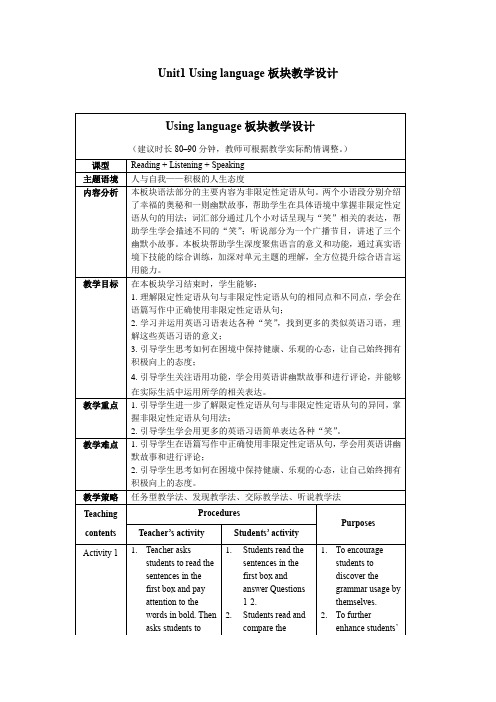
2.引导学生思考如何在困境中保持健康、乐观的心态,让自己始终拥有积极向上的态度。
教学策略
任务型教学法、发现教学法、交际教学法、听说教学法
Teaching contents
Procedures
Purposes
Teacher’s activity
Students’activity
Activity 1
1.Teacher asks studentsto readthe sentences in the first boxand payattention to the words in bold. Then asksstudents toanswer Questions 1-2.
4.Teacher asks students to look for more sentences with the similar structures in the reading passage, and helps students to summarise the uses of non-defining attributive clauses.
1.Studentsreadthe sentences in the first boxandanswer Questions 1-2.
2.Students read and compare theexample sentences again to answerQuestion 3.
3.Students conclude the uses of non-defining attributive clauses and the similarities and differences of defining attributive clauses and non-defining attributive clauses.
外研选择性必修一Unit1 Using Language 名师教学设计

Unit 1 Using Language 名师教学设计●课时内容本课时涉及的是语言知识运用,包括Non-defining attributive clauses和Fun time!两部分。
Non-defining attributive clauses部分讲解非限制性定语从句,要求学生学会在具体语境中分析引导词在从句中所作的成分,选择正确的引导词。
Fun time!包括两部分:第一部分以听力练习的形式呈现三个小对话,帮助学生学习用不同的表达来描述“笑”,引导学生乐观、豁达地处理周围的事物。
第二部分主要以读、听、说的方式介绍愚人节的习俗以及三个幽默小故事,引导学生用英语讲幽默故事和发表评论,培养学生的幽默感,学会以幽默化解尴尬,发挥幽默在人际交往中的作用。
●课时目标1.掌握本课时的重点词汇essential、Impress、deserve,take away、make sense、come true、be pleased with、play practical jokes on的用法,并能在真实语境中灵活运用。
2.掌握非限制性定语从句的用法。
3.引导学生关注语用功能,学会用英语讲述幽默故事,并能够运用所学知识进行评论。
4.通过阅读侦探福尔摩斯和好友华生医生的故事,学会以幽默化解尴尬,让学生了解更多的关于幽默的故事,培养幽默感。
●重点难点:重点:非限制性定语从句的用法。
难点:1.非限制性定语从句的用法。
2.学会适时的幽默,培养自己在交际中的幽默感。
●教学准备:教师准备:1.做好该部分内容的PPT和音频材料。
2.准备好关于侦探福尔摩斯和华生医生的幽默故事。
学生准备:1.课前观看福尔摩斯故事的片段,并能用英语简短地描述当时的故事场景。
2.上网查找非限制性定语从句的用法,了解其和限制性定语从句的区别。
3.预习课本P5~7的内容,找出该部分的新词汇并根据上下文猜测其含义。
教学过程:Step Ⅰ GrammarNon-defining attributive clauses1. Do Activity 1 on Page 5.(1) Ask students to look at the sentences from the reading passage and answer the questions:·What do“where”,“which”and“when”refer to in each sentence?·Which sentences contain a clause with essential information and which with extra information? If you take away the clauses, do the sentences still make sense?·Which clauses are separated by a comma, the ones with essential information or the ones with extra information?(2) Ask students to look for more sentences with non-defining attributive clauses in the reading passage, and summarise their uses in their own words.2. Give more examples of the usages of non-defining attributive clauses. Then ask students to give examples.3. Do Activity 2 on Page 5.4. Do Activity 3 on Page5.Ask students to do the Activity individually first and then check answers together.5.Ask students to think of a joke they find funny and write it down using non-defining attributive clauses where appropriate Then ask them to share their joke with the class.【备注】语法知识点讲解详见第二教案“重点语法精讲”部分。
人教版高中英语选择性必修第一册 U1 Grammar导学案

年级:班级:学生姓名:科目: 英语制作人:________ 教科室审批:________Unit1 People of AchievementGrammar: non-restrictive attributive clausesMotto: Try to become not a man of success, but try rather to become a man of value.不要为成功而努力,要为做一个有价值的人努力。
I. Learning aims1.To find out the differences in form and functions between restrictive relative clauses and non-restrictive relative clauses.2.To introduce a great person using non-restrictive relative clauses.3.To express their own ideas and opinions using non-restrictive relative clauses.II. Learning guidance and testsLearning guidance Tests1.Lead-in Guess the name of a song according to the meanings of these sentences.1.There is a pretty girl whose name is Xiaowei.2.That's the day when you come in the quiet summer.3.Love is a wonder which takes my breath away.4.There is never a wound that cannot be cured.2.Revision He is an English teacher who likes singing songs.Summary: 定语从句在复合句中的作用相当于_______词,在句中作______修饰___词或____词。
Unit 1 Using language 语言点高中英语人教版(2019)选择性必修第一册
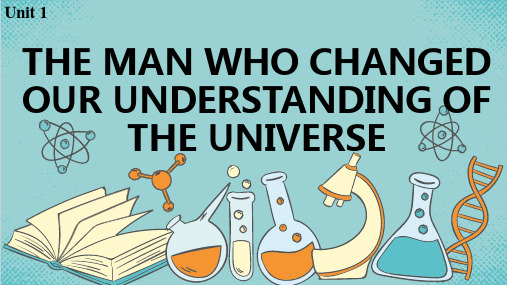
adj.勇敢的,有胆量的
kind figure loved by many people.
n.数字(符号);身材;人物 v.(以重要地位)出现;理解,弄懂
爱因斯坦不仅是一个天才,还是一个勇敢而善良的人, 受到许多人的喜爱。
Para.2
adj.温柔的,文静的
This gentle genius was born in Germany on 14 March
1. The work ___fi_n_i_s_h_e_d__ (finish), they left the office and went home.
2. The exam ___t_o__b_e_h__e_ld__ (hold) tomorrow, I couldn’t go to the
cinema tonight.
经过多次这样的场合后,他终于开始说:“对不起! 对不起!我总是被误认为是爱因斯坦教授!”
Para.6 It + be + V.-ed+ that… 据报道
On 18 April 1955, it was reported that Einstein had passed
away, and the whole world mourned the great loss of a v.哀悼;忧伤
解释,意见
n. 宇宙,天地万物 uni(一个)+vers(转向)+e(统一旋转)
改变了我们对宇宙认识的人
Para.1
非限定
Albert Einstein, who is perhaps the greatest scientist in
主语
谓语
consider v. 考虑;认为;体贴
新教材高中英语Unit1第2课时Usinglanguage学案含解析外研版必修第一册(含答案)
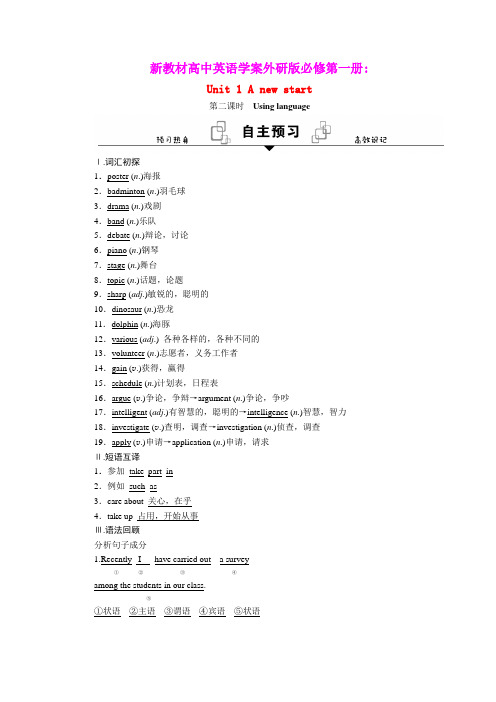
新教材高中英语学案外研版必修第一册:Unit 1 A new start第二课时Using languageⅠ.词汇初探1.poster (n.)海报2.badminton (n.)羽毛球3.drama (n.)戏剧4.band (n.)乐队5.debate (n.)辩论,讨论6.piano (n.)钢琴7.stage (n.)舞台8.topic (n.)话题,论题9.sharp (adj.)敏锐的,聪明的10.dinosaur (n.)恐龙11.dolphin (n.)海豚12.various (adj.) 各种各样的,各种不同的13.volunteer (n.)志愿者,义务工作者14.gain (v.)获得,赢得15.schedule (n.)计划表,日程表16.argue (v.)争论,争辩→argument (n.)争论,争吵17.intelligent (adj.)有智慧的,聪明的→intelligence (n.)智慧,智力18.investigate (v.)查明,调查→investigation (n.)侦查,调查19.apply (v.)申请→application (n.)申请,请求Ⅱ.短语互译1.参加take_part_in2.例如such_as3.care about 关心,在乎4.take up 占用,开始从事Ⅲ.语法回顾分析句子成分1.Recently① I②have carried out③a survey④among the students in our class⑤.①状语__②主语__③谓语__④宾语__⑤状语2.One day①some of my students②were talking about③what we would like to be in the future④.①状语__②主语__③谓语__④宾语3.Music①can make②our mind③in a peaceful state④after a whole day of tiring work⑤.①主语__②谓语__③宾语__④宾补__⑤状语4.The meeting①held yesterday②was important③.①主语__②定语__③谓语(系动词+表语)5.Every day①he②was forced③to work from morning till night④.①状语__②主语__③谓语__④主补6.Word①came②that the mayor would pay a visit to our③school next week③.①主语__②谓语__③同位语1 debate(1)n.争论;辩论There had been much debate on the issue of childcare.人们对儿童照管问题议论纷纷。
英语必修3人教版新课标unit1教案(usinglanguage)
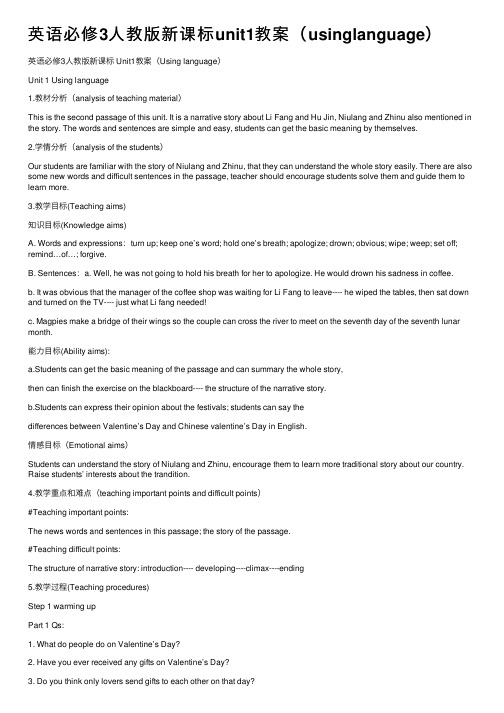
英语必修3⼈教版新课标unit1教案(usinglanguage)英语必修3⼈教版新课标 Unit1教案(Using language)Unit 1 Using language1.教材分析(analysis of teaching material)This is the second passage of this unit. It is a narrative story about Li Fang and Hu Jin, Niulang and Zhinu also mentioned in the story. The words and sentences are simple and easy, students can get the basic meaning by themselves.2.学情分析(analysis of the students)Our students are familiar with the story of Niulang and Zhinu, that they can understand the whole story easily. There are also some new words and difficult sentences in the passage, teacher should encourage students solve them and guide them to learn more.3.教学⽬标(Teaching aims)知识⽬标(Knowledge aims)A. Words and expressions:turn up; keep one’s word; hold one’s breath; apologize; drown; obvious; wipe; weep; set off; remind…of…; forgive.B. Sentences:a. Well, he was not going to hold his breath for her to apologize. He would drown his sadness in coffee.b. It was obvious that the manager of the coffee shop was waiting for Li Fang to leave---- he wiped the tables, then sat down and turned on the TV---- just what Li fang needed!c. Magpies make a bridge of their wings so the couple can cross the river to meet on the seventh day of the seventh lunar month.能⼒⽬标(Ability aims):a.Students can get the basic meaning of the passage and can summary the whole story,then can finish the exercise on the blackboard---- the structure of the narrative story.b.Students can express their opinion about the festivals; students can say thedifferences between Valentine’s Day and Chinese valentine’s Day in English.情感⽬标(Emotional aims)Students can understand the story of Niulang and Zhinu, encourage them to learn more traditional story about our country. Raise students’ interests about the trandition.4.教学重点和难点(teaching important points and difficult points)#Teaching important points:The news words and sentences in this passage; the story of the passage.#Teaching difficult points:The structure of narrative story: introduction---- developing----climax----ending5.教学过程(Teaching procedures)Step 1 warming upPart 1 Qs:1. What do people do on Valentine’s Day?2. Have you ever received any gifts on Valentine’s Day?3. Do you think only lovers send gifts to each other on that day?Part 2 : Do we have our own Valentine’s Day in China?Qiqiaojie (乞巧节) ---- the seventh day of the seventh lunar monthWell-known poem: Eternal love between us two, Shall withstand the time apart (两情若是久长时,⼜岂在朝朝暮暮。
Unit 1 Using Language(教学设计)-高中英语人教版(2019)选择性必修一
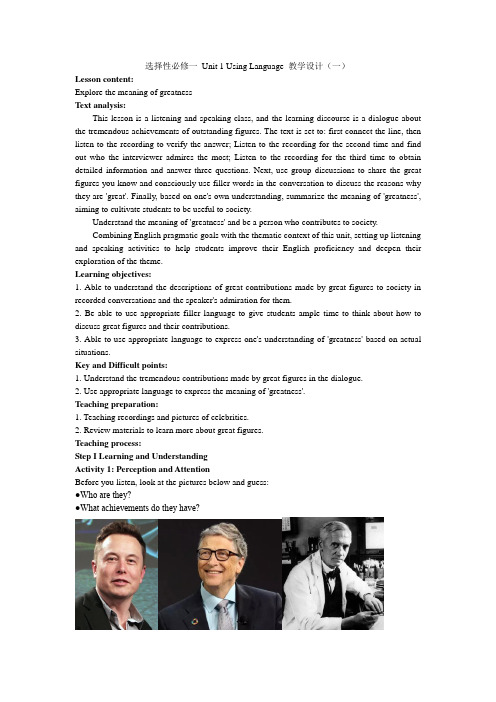
选择性必修一Unit 1 Using Language 教学设计(一)Lesson content:Explore the meaning of greatnessText analysis:This lesson is a listening and speaking class, and the learning discourse is a dialogue about the tremendous achievements of outstanding figures. The text is set to: first connect the line, then listen to the recording to verify the answer; Listen to the recording for the second time and find out who the interviewer admires the most; Listen to the recording for the third time to obtain detailed information and answer three questions. Next, use group discussions to share the great figures you know and consciously use filler words in the conversation to discuss the reasons why they are 'great'. Finally, based on one's own understanding, summarize the meaning of 'greatness', aiming to cultivate students to be useful to society.Understand the meaning of 'greatness' and be a person who contributes to society.Combining English pragmatic goals with the thematic context of this unit, setting up listening and speaking activities to help students improve their English proficiency and deepen their exploration of the theme.Learning objectives:1. Able to understand the descriptions of great contributions made by great figures to society in recorded conversations and the speaker's admiration for them.2. Be able to use appropriate filler language to give students ample time to think about how to discuss great figures and their contributions.3. Able to use appropriate language to express one's understanding of 'greatness' based on actual situations.Key and Difficult points:1. Understand the tremendous contributions made by great figures in the dialogue.2. Use appropriate language to express the meaning of 'greatness'.Teaching preparation:1. Teaching recordings and pictures of celebrities.2. Review materials to learn more about great figures.Teaching process:Step I Learning and UnderstandingActivity 1: Perception and AttentionBefore you listen, look at the pictures below and guess:●Who are they?●What achievements do they have?【设计意图】在学习之前,呈现伟大人物的图片,并简单讨论他们的成就,激活学生的背景知识。
新课标人教版英语选择性必修一Unit1UsingLanguage导学案及答案
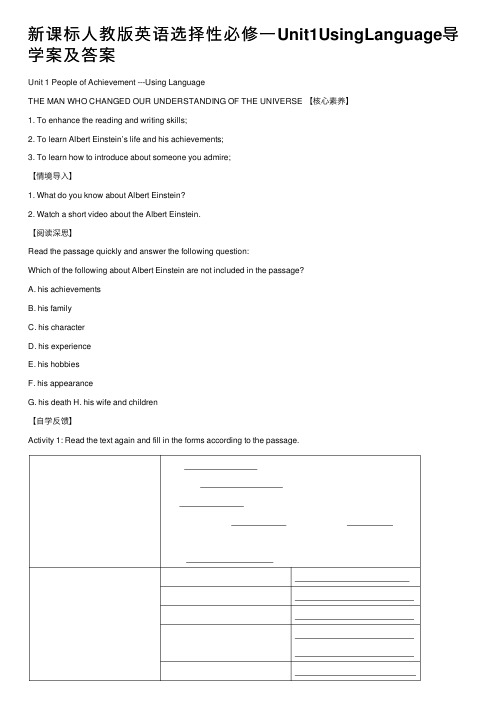
新课标⼈教版英语选择性必修⼀Unit1UsingLanguage导学案及答案Unit 1 People of Achievement ---Using LanguageTHE MAN WHO CHANGED OUR UNDERSTANDING OF THE UNIVERSE 【核⼼素养】1. To enhance the reading and writing skills;2. To learn Albert Einstein’s life and his achievements;3. To learn how to introduce about someone you admire;【情境导⼊】1. What do you know about Albert Einstein?2. Watch a short video about the Albert Einstein.【阅读深思】Read the passage quickly and answer the following question:Which of the following about Albert Einstein are not included in the passage?A. his achievementsB. his familyC. his characterD. his experienceE. his hobbiesF. his appearanceG. his death H. his wife and children【⾃学反馈】Activity 1: Read the text again and fill in the forms according to the passage.【⾃主探究】⾃主探究1:Discuss the following questions in pairs1. Apart from his remarkable achievements, what does the passage tell us about Einstein’s life?2. What impressed you most about Einstein? State your reasons.⾃主探究2:Study the organisation and language features1. What type of writing is this text? How does the writer develop the text?2. Find the descriptions that tell us what Einstein looked like and what kind of person he was.3. What rhetorical devices are used in the passage? Give examples.【成果展⽰】Please show your answers based on the above discussion.【点评精讲】1. General structure and language features of the passage;2. Useful expressions for introducing someone you admire.(1) Birth date(2) Introduction to the age, height, weight etc.(3) Words and expressions for character and qualities(4) words and expressions for comment3. Complicated sentence analysis【随堂检测】Albert Einstein is _________ (consider) a genius. the greatest scientist in modern physics and one of the _________ (smart) men. He made numerous _________(contribute) to the world._________ 14 March 1879, he was born in Germany. In 1896 he managed _________ (enter)-university and graduated in 1900. In 1905, he earned a doctorate in physics and _________ (publish) four extraordinary physics papers. Not until 1909 _________ he enter research full-time at a university. And in 1922, He was awarded the 1921 Nobel Prize for his explanation of the photoelectric effect. Unfortunately, in 1933, he had to flee Germany after Hitler came to power _________ he was a Jewish. He took up a position as a researcher at the Institute for Advanced Study in Princeton, USA _________ continued to make great achievements in physics and mathematics. On 18 April 1933, he passed _________.【巩固应⽤】Choose the person you are going to write about. It should be someone you think is great in some way. It can be an ordinary person, such as a parent, a relative, or a friend.Write an introduction to the person in 100 words.参考答案Unit 1 People of Achievement ---Using LanguageTHE MAN WHO CHANGED OUR UNDERSTANDING OF THE UNIVERSE 【阅读深思】Read the passage quickly and answer the following question:Which of the following about Albert Einstein are not included in the passage?A. his achievementsB. his familyC. his characterD. his experienceE. his hobbiesF. his appearanceG. his death H. his wife and children【⾃学反馈】Activity 1: Read the text again and fill in the forms according to the passage.【⾃主探究】⾃主探究2:Study the organisation and language features1. What type of writing is this text? How does the writer develop the text?It is a biography. The writer developed the text in order of time.2. Find the descriptions that tell us what Einstein looked like and what kind of person he was. Slightly odd-looking, a thick moustache and long white hair; courageous and kind, gentle, kind andfunny, sometimes forgot things, loved by his friends and neighbours.3. What rhetorical devices are used in the passage? Give examples.Simile.He had a thick moustache and long white hair, which sometimes stood on end as though he had just received an electric shock.【随堂检测】Albert Einstein is considered (consider) a genius. the greatest scientist in modern physics and one of the smartest (smart) men. He made numerous contributions (contribute) to the world.On 14 March 1879, he was born in Germany. In 1896 he managed to enter (enter)-university and graduated in 1900. In 1905, he earned a doctorate in physics and published (publish) four extraordinary physics papers. Not until 1909 could/did he enter research full-time at a university. And in 1922, He was awarded the 1921 Nobel Prize for his explanation of the photoelectric effect. Unfortunately, in 1933, he had to flee Germany after Hitler came to power because he was a Jewish. He took up a position as a researcher at the Institute for Advanced Study in Princeton, USA and continued to make great achievements in physics and mathematics. On 18 April 1933, he passed away.。
Unit 1 Using Language 1 教学设计人教版(2019)选择性必修一

高中英语新人教版选择性必修一Unit1 Using Language 1教学设计
教材分析
本单元围绕“卓有成就的人物〞〔People of Achievement〕这一主题展开,属于人与自我、人与社会的主题语境范畴。
本课的课时目标是“Explore the meaning of greatness〔探寻伟大的含义〕〞,学生将通过听前铺垫和听力活动了解一些伟大人物,并就其伟大的原因展开讨论,发表观点,从而树立起正确的人生观和价值观。
从主题意义的单元整体教学设计角度来看,本课时是第一课时,应当带着学生激活主题相关的表达与思维,初探“伟大〞之意。
学情分析
本课的授课对象为新高二的学生。
经过高一的英语学习,他们已经掌握了一些主题相关的词汇,习得了一些听力技巧,能够直接地表达自己的观点,但仍存在一些缺乏,如:词汇的数量与质量都有限、听力技巧运用不熟练、口头输出能力不强,逻辑不够缜密等。
教师需要在本课时的教学设计中关注到这些问题,有针对性地设计学习活动,以提升学生的听力能力、表达能力和思维能力。
教学目标
语言能力:
1. 学生能够掌握一些主题相关的词汇,如:torch, responsive, found 等
2. 学生能够获得、听懂、理解导入环节和听力环节中伟大人物的伟大原因,展开探讨。
3. 学生能够正确有效地介绍自己心中的伟大人物,并且说明其伟大之处。
学习能力
1. 学生能够通过听力学习活动获取有效信息,关注重点片段,获取因果关系,提升泛听与精听的能力。
文化意识
1. 学生能够了解国内外伟人的成长经历和重要奉献,探索这些人物的共同品质,深入理解“伟大〞的含义。
高二英语人教版选择性必修第一册教案:Unit 1

Unit 1 People of AchievementReading and Thinking教学设计科目:英语课题:Reading and Thinking 课时:1课时教学目标与核心素养:知识目标:掌握与人物描述有关的词汇和表达能力目标:培养学生略读能力,以及按照逻辑顺序对文章进行总结的能力。
情感目标:通过了解屠呦呦这位杰出科学家的科研经历,学习如何面对困难和挑战,如何为实现目标而努力,从而为国家作贡献;树立尊重知识、尊重科学家的价值观。
教学重难点教学重点:掌握人物传记类阅读的问题特点教学难点:引导学生按一定的逻辑整理文章思路。
课前准备:多媒体,黑板,粉笔教学过程:一、Pre-reading1. Greeting2. Leading-in教师活动:Let students discuss following questions in groups.1. What kind of person makes great discoveries?2. Which is more important for making a great discovery, talent or effort?Examples:1 I think if a person is careful, hardworking, patient, persistent, committed or talented,he/she is bound to make great discoveries.2 In my opinion, effort is more important than talent for making a great discovery. Ittakes a long time for people to come to know things. If a person does not make effort,he does not have patience to carry on. Even if he is very talented, he will achievenothing.二、While- reading1.教师活动:Explain the new words in the text, then let students scan the text andfind descriptive words about Tu Youyou.2.学生活动:略读文本,完成以下问题,师生核对答案。
新教材 人教版高中英语选择性必修第一册全册精品学案(知识点汇总及配套习题,含解析)
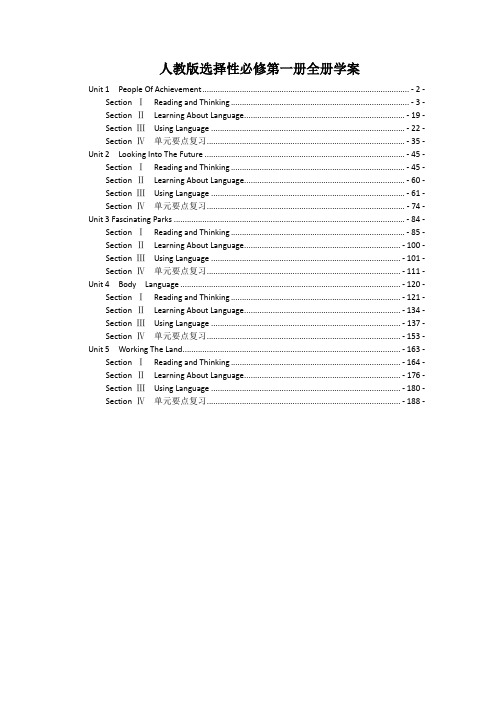
人教版选择性必修第一册全册学案Unit 1People Of Achievement .............................................................................................. - 2 - Section ⅠReading and Thinking ................................................................................. - 3 - Section ⅡLearning About Language ......................................................................... - 19 - Section ⅢUsing Language ........................................................................................ - 22 - Section Ⅳ单元要点复习.......................................................................................... - 35 - Unit 2Looking Into The Future ........................................................................................... - 45 - Section ⅠReading and Thinking ............................................................................... - 45 - Section ⅡLearning About Language ......................................................................... - 60 - Section ⅢUsing Language ........................................................................................ - 61 - Section Ⅳ单元要点复习.......................................................................................... - 74 - Unit 3 Fascinating Parks ......................................................................................................... - 84 - Section ⅠReading and Thinking ............................................................................... - 85 - Section ⅡLearning About Language ....................................................................... - 100 - Section ⅢUsing Language ...................................................................................... - 101 - Section Ⅳ单元要点复习........................................................................................ - 111 - Unit 4Body Language .................................................................................................... - 120 - Section ⅠReading and Thinking ............................................................................. - 121 - Section ⅡLearning About Language ....................................................................... - 134 - Section ⅢUsing Language ...................................................................................... - 137 - Section Ⅳ单元要点复习........................................................................................ - 153 - Unit 5Working The Land ................................................................................................... - 163 - Section ⅠReading and Thinking ............................................................................. - 164 - Section ⅡLearning About Language ....................................................................... - 176 - Section ⅢUsing Language ...................................................................................... - 180 - Section Ⅳ单元要点复习........................................................................................ - 188 -Unit 1People Of AchievementStephen Hawking was born on the 300th anniversary of Galileo's death.He has come to be thought of as the greatest mind in physics since Albert Einstein.Hawking grew up outside London.His father was a doctor;his mother was active in politics.He was not a smart schoolboy,but knew from early on that he would study science.He became good at mathematics and in 1958 he and some friends built a simple computer that actually worked.In 1959 he won a scholarship to Oxford University.In 1962 he got his degree with honors and went to Cambridge University to get a PhD in cosmology.There he became interested in black holes.After receiving his PhD, he stayed at Cambridge,becoming known even in his middle 20s for his pioneering ideas.In 1968 he studied in the Institute of Astronomy in Cambridge.He published the very technical book,The Large Scale Structure of Space-Time and afterwards made a great discovery.It had always been thought that nothing could escape a black hole.He continued working on the theory of the origin of the universe.At the age of 32, he was named a fellow of the Royal Society; at the same year he received the Albert Einstein Award.Five years later, in 1979, he was appointed Top Professor of Mathematics at Cambridge, which was held by Sir Isaac Newton 300 years earlier.In 1988 Hawking wrote A Brief History of Time, which became a best-seller.He wrote other popular articles and appeared in movies and television.He remains extremely busy, and his work hardly slowed by the disease that affects muscle control, for which he uses a wheelchair and speaks through a speech computer.He said,“My goal is simple.It is complete understanding of the universe,why it is as it is and why it exists at all.”开启快乐学习之旅斯蒂芬·霍金生于伽利略去世的300周年纪念日。
Unit 1 Using language(教学设计)高中英语人教版(2019) 选择性必修第一册
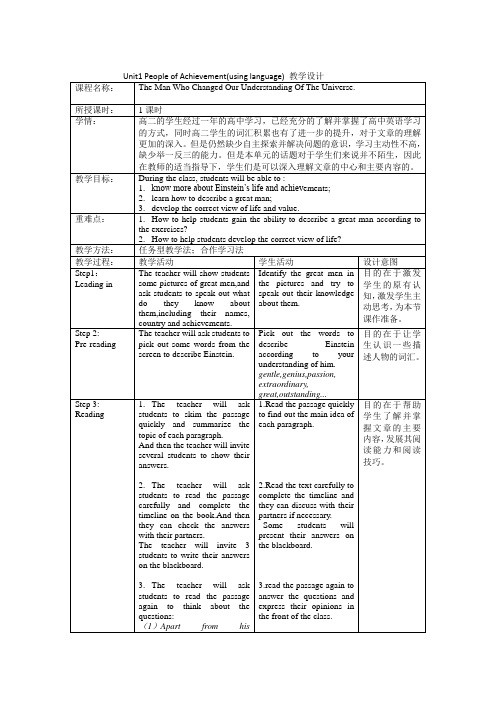
gentle,genius,passion, extraordinary, great,outstanding...
目的在于让学生认识一些描述人物的词汇。
(2)Find the descriptions that tell us what Einstein looked like and what kind of person he was?
目的在于培养学生的探索思维和举一反三的能力,同时发展学生的合作学习能力。
Step5:
Writing
The teacher will ask students to find out the useful expressions from the passage that will be used to describe someone.
The teacher will invite 3 students to write their answers on the blackboard.
3.The teacher will ask students to read the passage again to think about the questions:
1.Read the passage quickly to find out the main idea of each paragraph.
2.Read the text carefully to complete the timeline and they can discuss with their partners if necessary.
人教版选择性必修一Unit1非限制性定语从句导学案
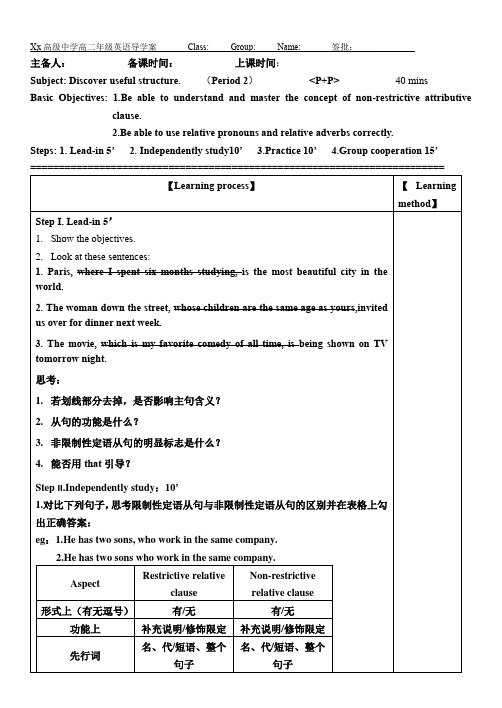
【Learning method】
Step I. Lead-in5’
1.Show the objectives.
2.Look at these sentences:
1. Paris,where I spent six months studying,is the mostbeautiful city in the world.
②关系代词who在非限制性定语从句中只能做主语,不能替代whom做宾语。
③whose作定语,先行词是人时, whose十n.相当于the + n. +of whom。先行词是物时, whose十n .相当于the+ n. +of which。
eg:1. This is the scientist whose achievements are well known.=This is the scientist,theachievementof whomare well known.
2.Be able to use relative pronouns and relative adverbs correctly.
Steps:1. Lead-in5’2.Independently study10’3.Practice 10’4.Group cooperation 15’
========================================================================
思考:
1.若划线部分去掉,是否影响主句含义?
2.从句的功能是什么?
3.非限制性定语从句的明显标志是什么?
4.能否用that引导?
2019新人教高中英语选择性必修一Unit1Using Language(p6-p9)公开课教案
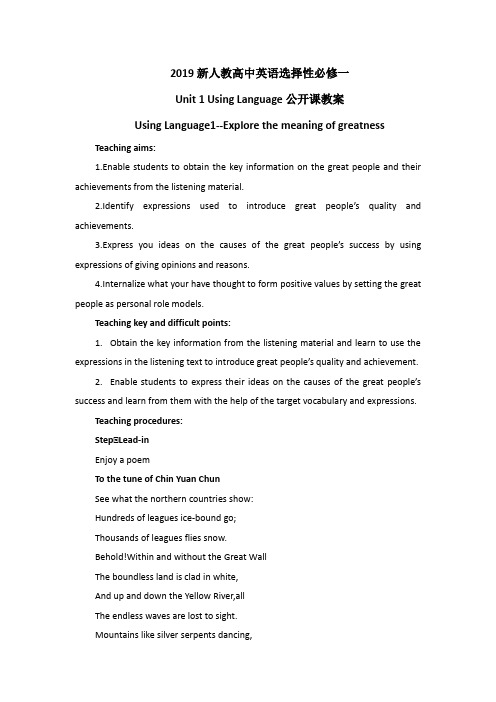
2019新人教高中英语选择性必修一Unit 1 Using Language公开课教案Using Language1--Explore the meaning of greatness Teaching aims:1.Enable students to obtain the key information on the great people and their achievements from the listening material.2.Identify expressions used to introduce great people’s quality and achievements.3.Express you ideas on the causes of the great people’s success by using expressions of giving opinions and reasons.4.Internalize what your have thought to form positive values by setting the great people as personal role models.Teaching key and difficult points:1.Obtain the key information from the listening material and learn to use the expressions in the listening text to introduce great people’s quality and achievement.2.Enable students to express their ideas on the causes of the great people’s success and learn from them with the help of the target vocabulary and expressions.Teaching procedures:StepⅠLead-inEnjoy a poemTo the tune of Chin Yuan ChunSee what the northern countries show:Hundreds of leagues ice-bound go;Thousands of leagues flies snow.Behold!Within and without the Great WallThe boundless land is clad in white,And up and down the Yellow River,allThe endless waves are lost to sight.Mountains like silver serpents dancing,Highlands like waxy elephants advancing,All try to match the sky in height.Wait till the day is fineAnd see the fair bask in sparkling sunshine,What an enchanting sight!Our motherland so rich in beautyHas made countless heroes vie to pay her their duty.But alas!Qin Huang and Han WuIn culture not well bred,And Tang Zong and Song ZuIn letters not wide read.And Genghis Khan,proud son of Heaven for a dayKnew only shooting eagles by bending his bows.They have all passed away;Brilliant heroes are thoseWhom we will see today!T:Dear class,let’s read the poem together. Do you know who wrote it? Which part do you like best? Why?Ss: It was written by Chairman Mao. I like the last sentence. Because it emphasises the important role that the present great people play and gives us the confidence in the present age.T:Yes, the age needs heroes and heroes create the age,too.So let’s know more about those great people and their achievement.StepⅠListening practiceActivity 1Match the people with their achievements.(1)Elon Musk A.founder of modern nursing(2)Bill Gates B.founded high-tech and futuristic companies(3)Jack Ma(Ma Yun) C.managed the SARS outbreak(4)Alexander Fleming D.made great advancement in online shopping(5)Florence Nightingale E.made home computing accessible(6)Zhong Nanshan F.discovered penicillinSuggested answers:(1)—B(2)—E(3)—D(4)—F(5)—A(6)—CActivity 2Fill in the blanks.(1)Elon Musk:He is the guy who founded a private space company,and also some other companies.He’s made .He is trying to help the of humankind.(2)Bill Gates & Jack Ma:They are really ,too.Just think of all the money they make.They have contributions to society.Bill Gates has given us home and Jack Ma makes it so easy to .(3)Zhong Nanshan:He is our ,who managed the SARS outbreak.Suggested answers:(1)millions of dollars;future(2)smart;positive;computing;shop online (3)personal heroActivity 3Listen to the conversation again.Who does each speaker admire?Tick in the table below.(红色为学生填写部分)Dr Wang Wang Lin Anna SmithElon Musk√Bill Gates√√Jack Ma√Zhong Nanshan√Florence Nightingale√Alexander Fleming√Dr Wang√Activity 4Listen again and answer the questions.(1)Why does Dr Wang say “money isn’t everything”?(2)What is the real reason Anna admires the famous people,and what examples does she give?(3)What kind of person do you think Wang Lin admires?Why?Suggested answers:(1)Because some people like Alexander Fleming,Florence Nightingale and Zhong Nanshan don’t make millions of money,but their contributions to health care have saved uncounted lives.(2)The real reason is that those people have worked so hard to achieve their goals and made uncounted contributions to society.She gives the examples of Elon Musk and Bill Gates.(3)She admires those who do good things inspiring her and her life.Because she lists the examples of Jack Ma and her father.StepⅢPost-listeningFinish the summary of the whole listening material.StepⅣTalkingActivity 1 Prepare small notes with deeds of celebrities, with one celebrity on each note,and let one student read the descriptions,other students guess who it is,and then classify according to the table and write them in the table below.Well,①er,...③ReallyYeah,I mean,I understand what you're saying...Well,I guess...Anyway,.. You see/know,... Just a moment. So,...Hang on a second.Well,it's on the lip of my tongue.May I think about that for a momentI've nearly got it,er,...How can/shall/should I put this/itWhat I want to say is...Let me think about this/that for a moment.Use the tip-list to help each other express your thoughts and ideas in a reasonable and complete way.(1)Body language:stand straight,proper gestures and eye contact with the audience.(2)Think for seconds before you speak out.(3)Use proper language fillers above to fill your stop time.(4)Give a summary of what you have introduced at the end of your introduction.Suggested answer:Jack:Bill,what makes these people great Bill:Um,may I think about that for a moment Jack:Jim,what's your opinion about itJim:I think it's the persistence that makes them great just like the father of India,er,...It's on the tip of my tongue,but...Bill:Mahatma Gandhi.Jim:Right.Bill:Besides,I guess it's also their wisdom that keeps them free from the dangers like Mao Zedong.Jack:You are both right.Activity 3 Use the discussion to draw conclusions about the meaning of greatness. The following expressions may help you. Then report back to the class.Suggested answer:Hello,everyone! The greatest person I know of is Dr Zhong Nanshan,who managed the SARS outbreak in China in 2003. Now it's he who prevented the COVID-19 from quick spread all over the country once again. To me, greatness means sacrifice and devotion. Dr Zhong Nanshan took risks entering the isolated area to cure the patients,summarizing the infected but recovered cases and sharing his successful experience with other home and abroad doctors. He serves as a good role model and makes great contributions to society. That's all. Thank you!Using Language2--Introduce someone you admire Teaching aims:1.Enable students to learn Albert Einstein’s life and his achievements.2. Figure out the organization and language features of the text.3.Identify how to introduce someone you admire.4. Write an introduction about someone you admire.Teaching key and difficult points:1.Enable students to figure out the organization and language features of the text2.Guide students to write an introduction about someone they admire.Teaching proceduresStepⅠLead-inReview some achievement of Tu Youyou and show the description of another man’s achievements.Ask the students guess who he is.StepⅠWhile-readingActivity1 Read for predictionsLook at the title and picture and predict what kind of article this is?The text mainly talks about Einstein’s and .Suggested answers:life;achievementsActivity2 Read for the detailed information1.Which of the following about Albert Einstein are not included in the passage?A.his achievementsB.his familyC.his characterD.his experiencesE.his hobbiesF.his appearanceG.his death H.his wife and childrenSuggested answers: B E H2.Read the passage again and complete the timeline.Suggested answers:Activity 3 Discuss the following questions in pairs1.Apart from his remarkable achievements,what does the passage tell us about Einstein’s life?2.What impressed you most about Einstein?State your reasons.Suggested answers:1.Although world-famous,he was still an ordinary and funny person who was also full of a childish and warm heart.2.When faced with failure or difficulties,he didn’t give up and chose to workhard to achieve his dream.For example,he failed in the entrance exam,but he chose to study harder for another year to achieve his dream.Moreover,because he was Jewish when Hitler came to power,the doors of academic institutions were closed to him.But after he succeeded in moving to America,he made great achievements in physics and mathematics.Activity 4Read for the organization and language features1.What type of writing is this text?How does the writer develop the text?2.Find the descriptions that tell us what Einstein looked like and what kind of person he was.3.What rhetorical devices are used in the passage?Give examples.Suggested answers:1.The text is a biography,which is developed chronologically.2.He had a thick moustache and long white hair,which sometimes stood on end as though he had just received an electric shock.Although he was a genius, he sometimes forgot things, like his friends’ birthdays.But despite his peculiarities, he was loved by his friends and neighbours.There is even a story about how he helped a little girl who knocked on his door and asked for help with her homework.In fact, Einstein often encountered people on the street who would stop him and ask him to help explain things.After many such occasions, he finally started saying, “Pardon me! Sorry! Always I am mistaken for Professor Einstein!”3.Analogy:as the new Isaac Newton;personification:long white hair,which sometimes stood on end;simile:as though he had just received an electric shock;metaphor:the doors of academic institutions;euphemism:passed away.StepⅠ Write an introduction about someone you admire1.Choose the person you are going to write about.It should be someone you think is great in some way.It can be an ordinary person,such as a parent,a relative,ora friend.2.Make a list of things that need to be included in your introduction.e your notes to write your introduction and sum up how you feel about this person.Writing material:请根据以下材料,写一篇介绍我国明代(the Ming Dynasty)医学家(medical scientist)李时珍的文章。
Using Language 听说课 教学设计-高中英语人教版(2019)选择性必修第一册

Matters needing attention
Teachers should scaffold students by explaining vocabulary in topics, listening skills and note-taking techniques.Before listening to the conversation, the teacher should help the students to understand the questions fully. And without revealing the corresponding achievements of people before starting Activity 1, let students use their prior knowledge to do so. In addition to this, students should be told not to feel worried if they feel unfamiliar with them, as the conversation that follows will help them.
2. Teaching difficult point
They are able tostate their ideas to talk about great people with using language fillers, which make natural conversation.
ⅡLesson Procedures
高中英语人教版选择性必修第一册 Unit 1 Section Ⅲ Using Language课后作
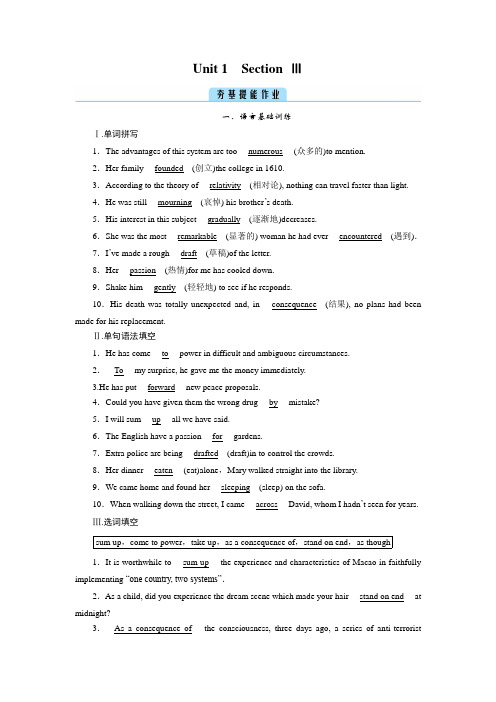
Unit 1Section Ⅲ一、语言基础训练Ⅰ.单词拼写1.The advantages of this system are too __numerous__ (众多的)to mention.2.Her family __founded__(创立)the college in 1610.3.According to the theory of __relativity__(相对论), nothing can travel faster than light.4.He was still __mourning__(哀悼) his brother’s death.5.His interest in this subject __gradually__(逐渐地)decreases.6.She was the most __remarkable__(显著的) woman he had ever __encountered__(遇到).7.I’ve made a rough __draft__(草稿)of the letter.8.Her __passion__(热情)for me has cooled down.9.Shake him __gently__(轻轻地) to see if he responds.10.His death was totally unexpected and, in __consequence__(结果), no plans had been made for his replacement.Ⅱ.单句语法填空1.He has come __to__ power in difficult and ambiguous circumstances.2.__To__ my surprise, he gave me the money immediately.3.He has put __forward__ new peace proposals.4.Could you have given them the wrong drug __by__ mistake?5.I will sum __up__ all we have said.6.The English have a passion __for__ gardens.7.Extra police are being __drafted__(draft)in to control the crowds.8.Her dinner __eaten__ (eat)alone,Mary walked straight into the library.9.We came home and found her __sleeping__(sleep) on the sofa.10.When walking down the street, I came __across__ David, whom I hadn’t seen for years.Ⅲ.选词填空sum up,come to power,take up,as a consequence of,stand on end,as though1.It is worthwhile to __sum up__ the experience and characteristics of Macao in faithfully implementing “one country, two systems”.2.As a child, did you experience the dream scene which made your hair __stand on end__ at midnight?3.__As a consequence of__ the consciousness, three days ago, a series of anti-terroristposters caused widespread alarm across Indonesia and Turkey.4.That Hitler __came to power__ was really a disaster to the world.5.Can you figure out the average living space that a person can __take up__ in this city?6.It seems __as though__ the difficulty will be over soon.二、培优提升训练Ⅰ.阅读理解Michael Jackson was on the road of performing when he was five years old.As is known to all, the road to fame and fortune is a long, hard one.Michael remembers those early years when he was young.“My father was a machine operator,”he explained, “and he worked at a steel plant.My mother worked at Sears, a big department store.But they were both musicians.”Michael’s father Joe Jackson realized his sons had a lot of talent, and he knew he could train them to become fine musicians.In those days there were plenty of music groups and some of them were very good.He knew if his sons were to stand out, they would have to be the best.Practice makes perfect.And the Jackson boys practised! Gradually the group took shape.Then word of this group began to get around.Thus Michael got a chance to do some solo(独唱) songs.In the following years, Michael was always on the top.One million records of his were sold in New Zealand, which has only a total population of three million!When Michael was eighteen, he entered another field of his career(生涯)—acting.“I plan to star in movies,” he told his friends, “but of course, my first love is music.”Michael wrote a lot of his own songs.“Songs came about in the strangest ways,” he said, “I’ll just wake up from sleeping and there is a whole song coming into my head.And then I put it down on the paper.”Still, with all his success, Michael managed to keep his head calm.“I just do a different job from other people,” he said, “but it doesn’t make me think I’m better than other people.”To be quite honest, his fans just love to hear and watch him!文章大意:本文是一篇记叙文。
2023外研版英语必修一unit1using language教案

2023外研版英语必修一unit1using language教案
一、教学目标:
1. 学生能够理解Using Language部分的内容和语境,能够正确使用相关的语言表达。
2. 学生能够通过阅读和讨论,提高跨文化交际的能力。
3. 学生能够通过小组活动,提高合作和沟通能力。
二、教学内容:
本单元的Using Language部分包括一篇阅读文章和相关的语言练习。
阅读文章主要讨论了不同文化背景下的人际交往方式,学生需要通过阅读和讨论,了解不同文化背景下语言表达的差异,并能够在实际生活中正确使用。
三、教学步骤:
1. 导入(5分钟):先引导学生回顾必修一第一单元的学习内容,再引入本单元的话题:不同文化背景下的语言交际。
2. 阅读文章(15分钟):让学生阅读文章,并解释文章中的一些重点词汇和表达。
3. 语言练习(20分钟):进行相关的语言练习,例如填空、选择题、作文等。
在练习中,应注意突出本单元的重点话题——不同文化背景下的语言交际。
4. 小组活动(25分钟):将学生分成若干小组,让他们讨论并回答一些与本单元话题相关的问题。
这些问题应与实际生活紧密相关,有助于提高学生的兴趣和参与度。
5. 反馈与总结(5分钟):教师对学生的学习情况进行反馈和总结,指出学生在学习中存在的问题,并给出相应的建议。
6. 布置作业(1分钟):让学生在家中继续讨论本单元的话题,并尝试用英语写一篇短文,谈谈在不同文化背景下如何进行有效的语言交际。
四、教学反思:
在教学过程中,应注意观察学生的参与度,以及他们在活动中的表现。
同时,应反思自己的教学方式和引导是否得当,以便在今后的教学中不断改进。
- 1、下载文档前请自行甄别文档内容的完整性,平台不提供额外的编辑、内容补充、找答案等附加服务。
- 2、"仅部分预览"的文档,不可在线预览部分如存在完整性等问题,可反馈申请退款(可完整预览的文档不适用该条件!)。
- 3、如文档侵犯您的权益,请联系客服反馈,我们会尽快为您处理(人工客服工作时间:9:00-18:30)。
Unit 1 People of Achievement ---Using LanguageTHE MAN WHO CHANGED OUR UNDERSTANDING OF THE UNIVERSE 【核心素养】1. To enhance the reading and writing skills;2. To learn Albert Einstein’s life and his achievements;3. To learn how to introduce about someone you admire;【情境导入】1. What do you know about Albert Einstein?2. Watch a short video about the Albert Einstein.【阅读深思】Read the passage quickly and answer the following question:Which of the following about Albert Einstein are not included in the passage?A. his achievementsB. his familyC. his characterD. his experienceE. his hobbiesF. his appearanceG. his death H. his wife and children【自学反馈】Activity 1: Read the text again and fill in the forms according to the passage.【自主探究】自主探究1:Discuss the following questions in pairs1. Apart from his remarkable achievements, what does the passage tell us about Einstein’s life?2. What impressed you most about Einstein? State your reasons.自主探究2:Study the organisation and language features1. What type of writing is this text? How does the writer develop the text?2. Find the descriptions that tell us what Einstein looked like and what kind of person he was.3. What rhetorical devices are used in the passage? Give examples.【成果展示】Please show your answers based on the above discussion.【点评精讲】1. General structure and language features of the passage;2. Useful expressions for introducing someone you admire.(1) Birth date(2) Introduction to the age, height, weight etc.(3) Words and expressions for character and qualities(4) words and expressions for comment3. Complicated sentence analysis【随堂检测】Albert Einstein is _________ (consider) a genius. the greatest scientist in modern physics and one of the _________ (smart) men. He made numerous _________(contribute) to the world._________ 14 March 1879, he was born in Germany. In 1896 he managed _________ (enter)-university and graduated in 1900. In 1905, he earned a doctorate in physics and _________ (publish) four extraordinary physics papers. Not until 1909 _________ he enter research full-time at a university. And in 1922, He was awarded the 1921 Nobel Prize for his explanation of the photoelectric effect. Unfortunately, in 1933, he had to flee Germany after Hitler came to power _________ he was a Jewish. He took up a position as a researcher at the Institute for Advanced Study in Princeton, USA _________ continued to make great achievements in physics and mathematics. On 18 April 1933, he passed _________.【巩固应用】Choose the person you are going to write about. It should be someone you think is great in some way. It can be an ordinary person, such as a parent, a relative, or a friend.Write an introduction to the person in 100 words.参考答案Unit 1 People of Achievement ---Using LanguageTHE MAN WHO CHANGED OUR UNDERSTANDING OF THE UNIVERSE【阅读深思】Read the passage quickly and answer the following question:Which of the following about Albert Einstein are not included in the passage?A. his achievementsB. his familyC. his characterD. his experienceE. his hobbiesF. his appearanceG. his death H. his wife and children【自学反馈】Activity 1: Read the text again and fill in the forms according to the passage.【自主探究】自主探究2:Study the organisation and language features1. What type of writing is this text? How does the writer develop the text?It is a biography. The writer developed the text in order of time.2. Find the descriptions that tell us what Einstein looked like and what kind of person he was. Slightly odd-looking, a thick moustache and long white hair; courageous and kind, gentle, kind andfunny, sometimes forgot things, loved by his friends and neighbours.3. What rhetorical devices are used in the passage? Give examples.Simile.He had a thick moustache and long white hair, which sometimes stood on end as though he had just received an electric shock.【随堂检测】Albert Einstein is considered (consider) a genius. the greatest scientist in modern physics and one of the smartest (smart) men. He made numerous contributions (contribute) to the world.On 14 March 1879, he was born in Germany. In 1896 he managed to enter (enter)-university and graduated in 1900. In 1905, he earned a doctorate in physics and published (publish) four extraordinary physics papers. Not until 1909 could/did he enter research full-time at a university. And in 1922, He was awarded the 1921 Nobel Prize for his explanation of the photoelectric effect. Unfortunately, in 1933, he had to flee Germany after Hitler came to power because he was a Jewish. He took up a position as a researcher at the Institute for Advanced Study in Princeton, USA and continued to make great achievements in physics and mathematics. On 18 April 1933, he passed away.。
